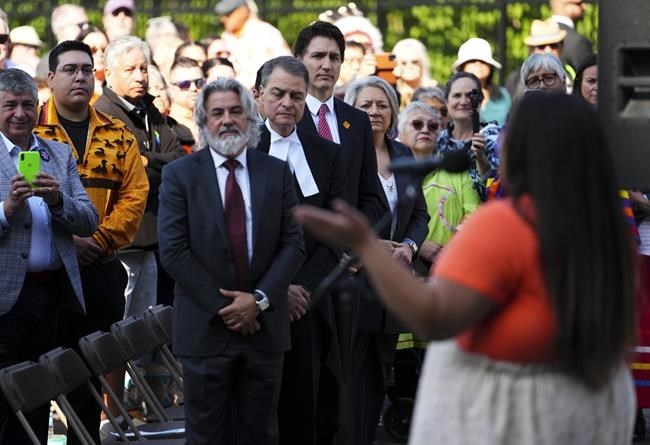OTTAWA — The federal government released its action plan on Wednesday to implement the United Nations Declaration on the Rights of Indigenous Peoples.
Its release coincided with the country marking National Indigenous Peoples Day, and followed feedback it received on a draft of the plan in April.
The government had presented its draft to chiefs gathered for a meeting of the Assembly of First Nations.
They formally called on Ottawa to do more consultations, and a lawyer who had been working with the assembly on the issue said the document contained too much "noncommittal language."
Justice Minister David Lametti said at the time that he knew the draft was not perfect and there was a lot of room for improvement.
The minister said Wednesday that following the gathering there were "intense" discussions about the document, and new measures were added.
Although its release came with no new funding commitment, Lametti said that will be discussed next.
The Liberal government said the finalized plan contains 181 measures it plans to take to uphold the advance the rights of First Nations, Inuit and Métis people.
Such measures include co-developing an approach to combat anti-Indigenous racism and guidance when it comes to engaging Indigenous Peoples on the development of resource projects.
The government had passed a law in 2021 requiring it return to Parliament with an implementation plan by June.
Lametti said the two-year timeline was "ambitious" and had been requested by Perry Bellegarde, the assembly's former national chief.
"We made it," he told a crowd of Indigenous leaders gathered in Ottawa for the report’s release.
"This represents a historic moment."
Lametti said the document is not perfect and is not designed to be "static."
Crown-Indigenous Relations Minister Marc Miller echoed his comments, saying it represents only the beginning of a process.
The Congress of Aboriginal Peoples circulated an open letter to Lametti on Wednesday saying it had been excluded from the process.
"It is not enough to say that you are consulting and co-operating with Indigenous Peoples, as purported in these documents," read a letter signed by its leadership.
"The government of Canada must listen, be inclusive, and take action from the input Indigenous Peoples provide."
Regional Chief Terry Teegee of the British Columbia Assembly of First Nations said Wednesday that he is among the chiefs who are concerned that the action plan as it is currently written could fall short.
But he added that he views it as a first step.
"Let's take this step together," he said. "Nothing good comes easy."
Inuit Tapiriit Kanatami President Natan Obed said the UN declaration affirms the existing human rights held by the Inuit and other Indigenous peoples, which successive governments have ignored.
"Our rights are not second-class rights," he said.
This report by The Canadian Press was first published June 21, 2023.
Stephanie Taylor, The Canadian Press
Note to readers: This is a corrected story. A previous version said the Liberal government's action plan to implement the United Nations Declaration on the Rights of Indigenous Peoples contains 131 specific measures.



